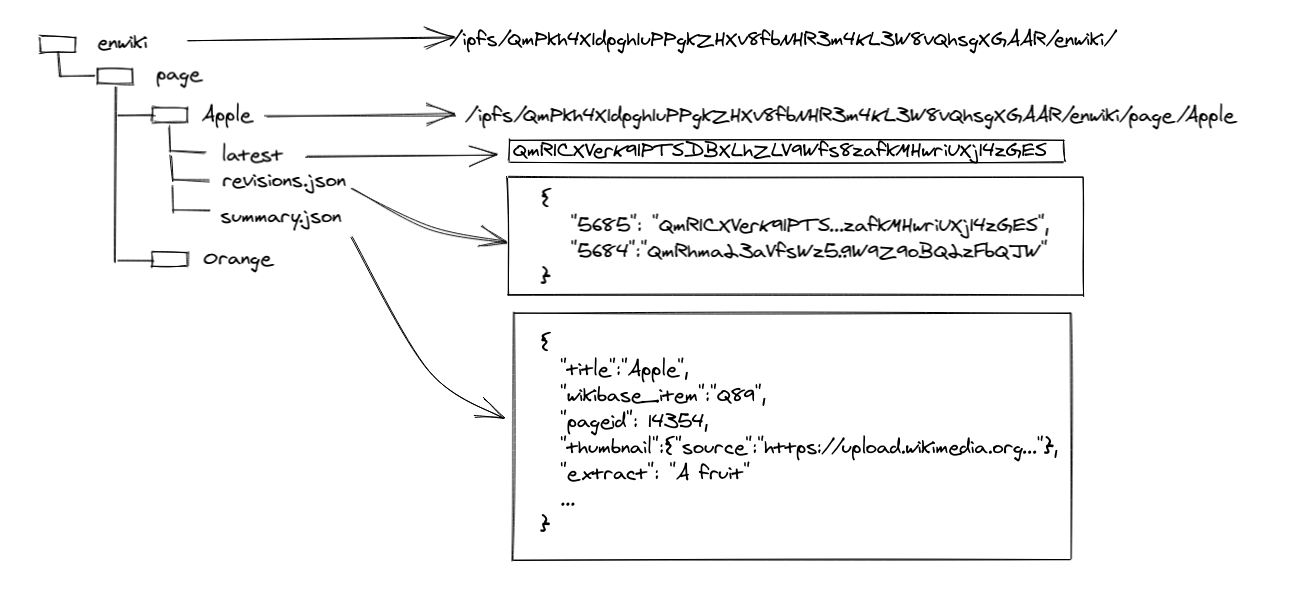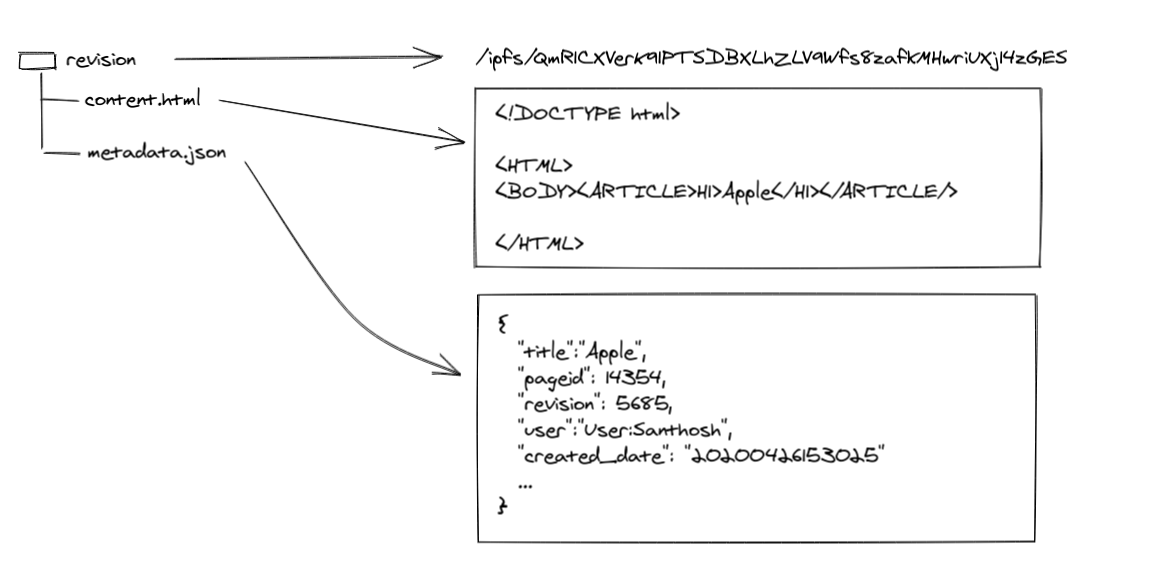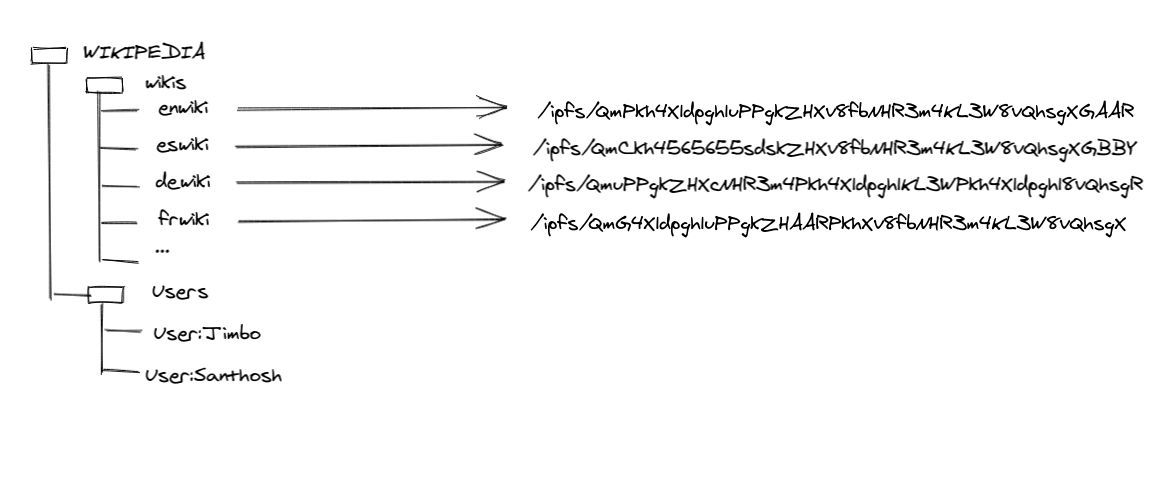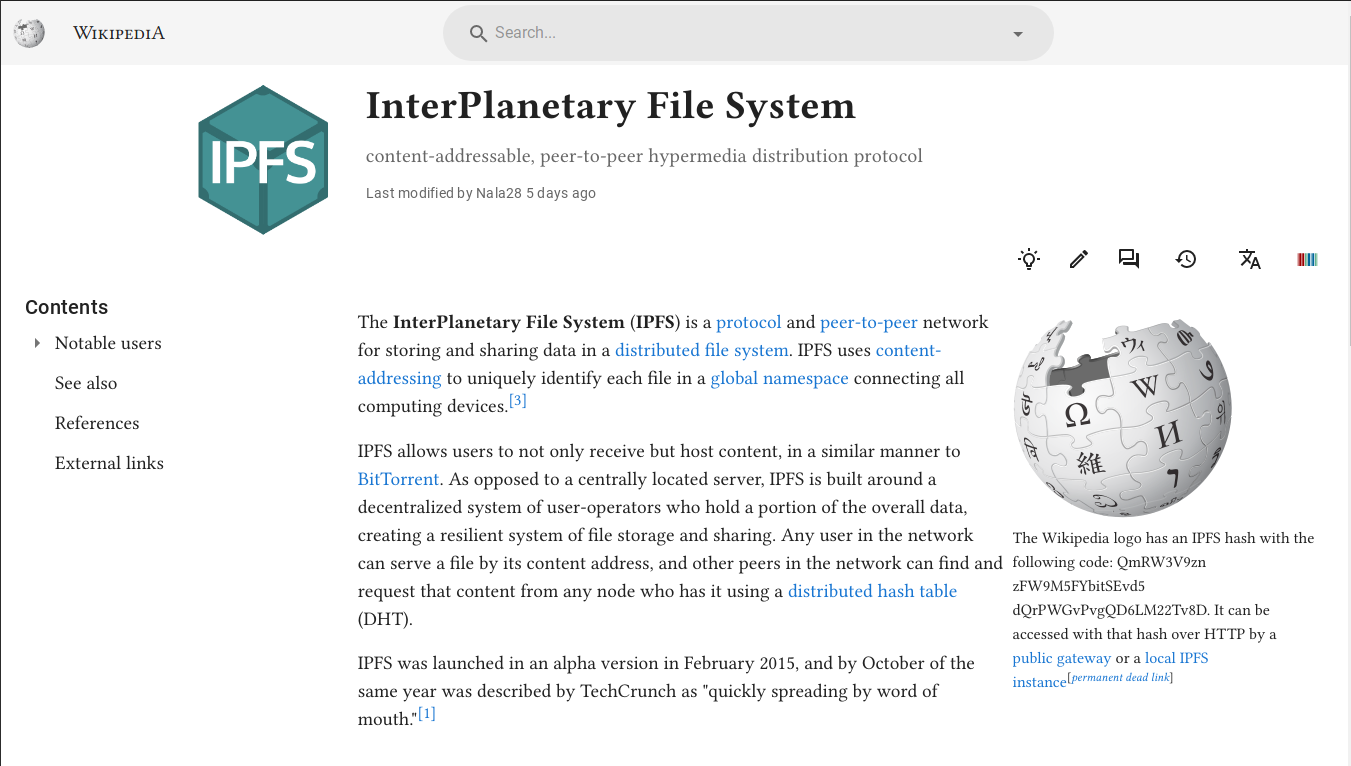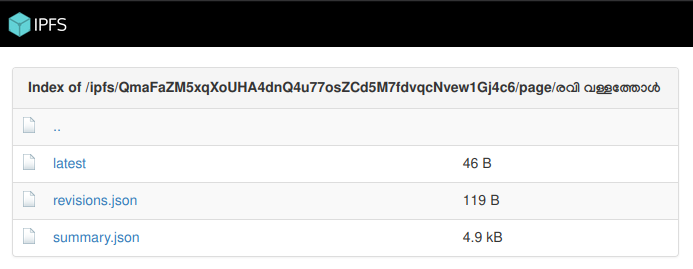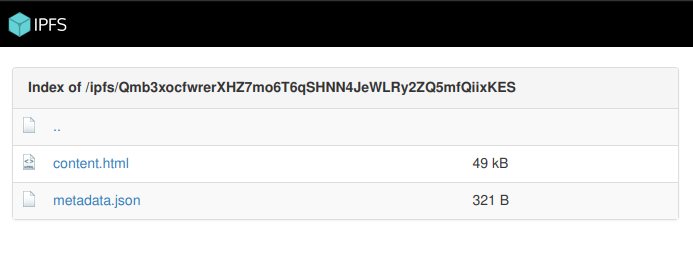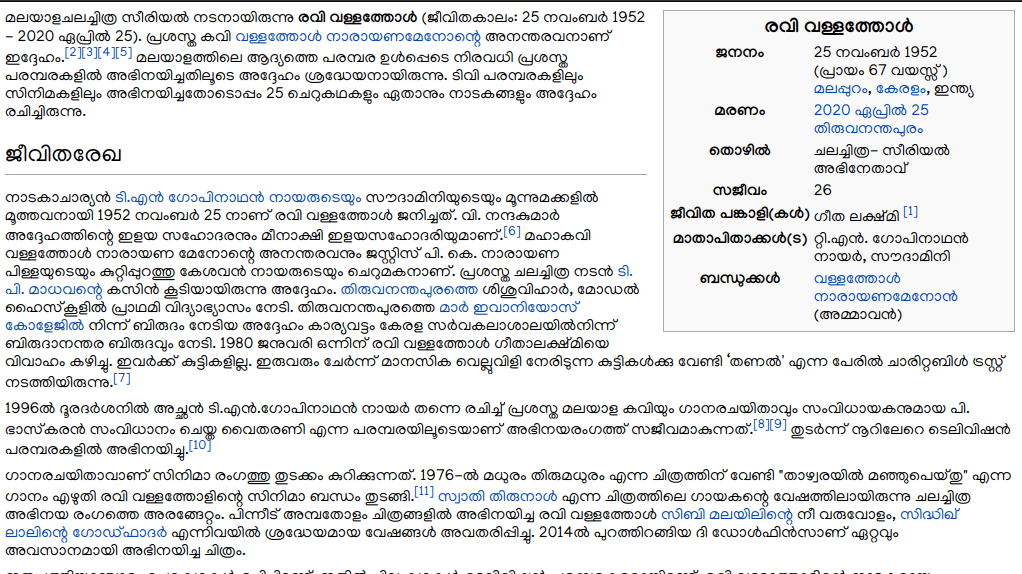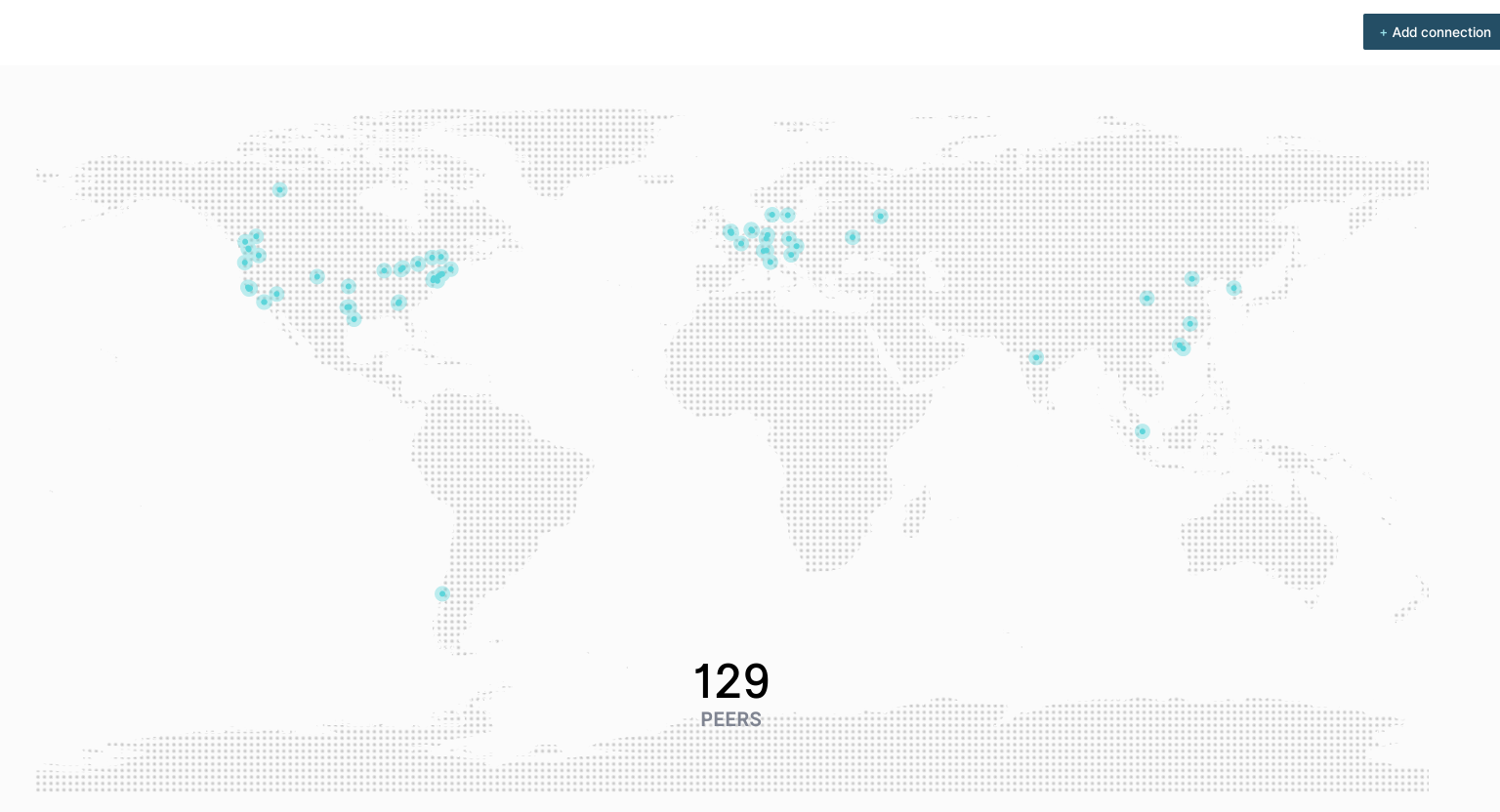An exploration to host Wikipedia in IPFS. This project contains code to extract content from wikipedia and add to IPFS and documentation of the proposed architecture. This is just a proof of concept and not ready for any serious use.
IPFS is a protocol for building decentralized web. Wikipedia is currently hosted in its servers. To decentralize the sum of all human knowledge, we need to host and maintain all such knowledge in a decentralized network. There are many candidates for such distributed web protocol. IPFS, DAT are some examples. None of them are highly popular among common internet users, but they are in more or less active development.
IPFS had attempted to host the Turkish wikipedia a few years back. It is based on static snapshot of wikipedia pages - basically static html files. If somebody update the hosted snapshot, users get that snapshot. But wikipedia is very dynamic. Thousands of edits happens every day. New articles are created every time. The pre-rendered HTML pages are not really a convenient representation of knowledge, at least it is not convenient for computing.
If you are not already familiar with the concepts of decentralized web and IPFS, please have some background reading about them to better understand this document.
- Every Wikipedia content revisions as objects in decentralized web. They are content addressable: This is basic units of content in wikipedia world. Each revision, once created, is immutable. There is no way you can change it. Each revision will have content associated with it and some metadata such as who create it and when.
- Every wikipedia article having an object in decentralized web with pointers to its revisions: An article in wikipedia is editable. The latest revision represent the current state of the article. But one can always access its old revisions at any point. It is desirable to have a human readable name along with IPFS hash id for each article.
- Every wikipedia having an object in decentralized web with addresses of its articles: A wikipedia is a collection of articles(But not limited to). So a wikipedia like English Wikipedia is kind of a registry with listing of all its articles. (In case you are wondering why I mention each wikipedia when there is a single wikipedia - You may not know this, but there are wikipedia in nearly 300 languages. English Wikipedia, Spanish Wikipedia, Tamil Wikipedia are examples)
- A Wikipedia reading web application that can live in a decentralized web: To make the content in decentralized web usable or consumable, we need a wikipedia reading and possibly editing interface. This application presents the content for human conception.
Let us define how we will define an article about "Apple" in English wikipedia.
As illustrated, a wiki is a directory with pages as subdirectories. But page content is not in this directory structure. The directory Apple only has its metadata and list of revisions and pointer to latest revision. In this example, accessing an IPFS object with content id(CID) QmR1CXVerK91PTSDBXLhZLV9Wfs8zafkMHwriUXj14zGES gives you the revision object with content.
Why not having each revisions and its content under Apple directory? As mentioned above, an article is mutable. It can be edited. A new revision can be added. When such changes happen, the content id(known as hash or CID) of its parent directory changes and this change causes CID of all its parents change. IPFS need to compute the CID of the whole directory enwiki. So this data in IPFS need to be designed as mutable file system(MFS). But revisions are immutable. Once a revision is created, it get a CID and thats it. No more change to that is allowed. It becomes a free floating data packet in decentralized network, addressable by its CID. It is relevant only when a registry tracks its address. An untracked revision CID is a deleted revision, it does not correspond to any article.
Let us look at what a revision contains:
You may wonder why an article like Apple cannot have an independent mutable IPFS object and wiki tracks it by address and not as a file under wiki directory. This is indeed possible, but I chose the idea of titles under wikipedia directory for fast discovery and search for articles by titles. Traversal of articles under a wiki will involve too many IPFS CID resolves in that case.
Finally we have the collection of wikipedia editions. We need to track this because that allows cross linking articles in different languages.
There are User accounts that are multi-wiki accounts. I think they should be represented similar to Articles. They are mutable objects.
If every edit change the CID or hash of wiki, how do we refer it in a permanent way? IPFS provides a way for this - It is name IPNS(Inter Planetory Naming System)
"Inter-Planetary Name System (IPNS) is a system for creating and updating mutable links to IPFS content. Since objects in IPFS are content-addressed, their address changes every time their content does. That’s useful for a variety of things, but it makes it hard to get the latest version of something. A name in IPNS is the hash of a public key. It is associated with a record containing information about the hash it links to that is signed by the corresponding private key. New records can be signed and published at any time."
So every wikipedia, in addition to its ipfs/CID address, there will be an IPNS address like /ipns/QwxoosidSOKWms... If that is not readable DNSLink comes handy and we can have addresses like /ipns/en.wikipedia.org.
The requirement of having a private key and generation of IPNS based on that is helpful for enforcing some authenticity - that this article is indeed published in wikipedia and nobody else can copy, modify and publish an IPFS structure with this IPNS. They can indeed copy, modify and publish, but never can have IPNS owned by wikipedia.
In the past, I(Santhosh) had attempted to build a static web application that can be hosted in distributed web. I used dat protocol for this and you can see this application in normal web at wikipedia.thottingal.in and wikipedia.hashbase.io - a pinning service or directly from dat protocol dat://aab37b6f74832891e5b2c593fac748df6379d81c0f2b781f713b0dde229a298d/ (this need Beaker browser).
I have placed this application in IPFS. See https://bafybeibgkplzawivq3w3evxj6uxy2e4uckgy3skyxicll7rxnrpuz6okn4.ipfs.dweb.link/
If you wonder why that does not look like IPFS URL, it is because this application as a Single Page Application with History mode routing, it need to be addressed from a domain or subdomain. So I used the dweb projects subdomain approach to access it. bafybeibgkplzawivq3w3evxj6uxy2e4uckgy3skyxicll7rxnrpuz6okn4 is base32 encoded form of QmQvGMPfub4HwD5BxuPQ95skHENw36wrkJisYMQWkgqdkJ. Alteratively this application can be run from desktop or mobile(it is a Progressive web app). Anyway, some work is required in this front, but there is a proof of concept. It currently uses the wikipedia REST API and need to rewire to take content from decentralized web.
I wrote a nodejs application that uploads the content to IPFS based on the content architecture outlined above. Each wikipedia has thousands of articles with millions of revisions corresponding to each edit. Instead of iterating through every wiki and every article, this application is listening the edit event stream - an event that is emitted when an edit happened. We also whitelist a small set of small wikis to listen for this events. Our application is not at all capable of processing all those millions of edits happening in all wikis all the time.
To add files to IPFS, we need an IPFS gateway, specifically a writable gateway. I used the go-ipfs and ran the IPFS daemon:
$ ipfs daemon --writable
Initializing daemon...
go-ipfs version: 0.4.23-
Repo version: 7
System version: amd64/linux
Golang version: go1.13.7
Swarm listening on /ip4/127.0.0.1/tcp/4001
Swarm listening on /ip4/172.17.0.1/tcp/4001
Swarm listening on /ip4/192.168.31.222/tcp/4001
Swarm listening on /ip6/::1/tcp/4001
Swarm listening on /p2p-circuit
Swarm announcing /ip4/127.0.0.1/tcp/4001
Swarm announcing /ip4/172.17.0.1/tcp/4001
Swarm announcing /ip4/192.168.31.222/tcp/4001
Swarm announcing /ip4/49.37.206.204/tcp/4001
Swarm announcing /ip6/::1/tcp/4001
API server listening on /ip4/127.0.0.1/tcp/5001
WebUI: http://127.0.0.1:5001/webui
Gateway (writable) server listening on /ip4/127.0.0.1/tcp/8082
Daemon is readyThere is a javascript implementation of of IPFS known as JS-IPFS, and you can write nodejs applications using that. But my initial attempt to use that faced so many issues and I decided to run IPFS daemon using GO-IPFS and use its web API. In our case the API is listening at localhost:5001. You may refer the HTTP api documentation. But, there is a js http client library that abstract all these API calls and gives a similar api of JS-IPFS. We use that in this project.
After running the daemon, we can run our code to add content. Before that install the dependencies using
npm install
And edit config.json file to whitelist the wikis we want to listen.
We need to create keys to publish wikis to permanent address(IPNS). For that use:
$ ipfs key gen --type=rsa --size=2048 ml.wikipedia.org.key
Repeat this for all the wikis we whitelisted. Make sure the key name is given correctly in config.json
Then start the program.
$ npm start
I have whitelisted Malayalam and Tamil wikis. A sample output looks like this:
> wikipedia-ipfs@ start /home/santhosh/work/exp/ipfs
> node src/index.js
Connected to IPFS server at http://127.0.0.1:5001
┌─────────┬───────────────┐
│ (index) │ Values │
├─────────┼───────────────┤
│ version │ '0.4.23' │
│ commit │ '' │
│ repo │ '7' │
│ system │ 'amd64/linux' │
│ golang │ 'go1.13.7' │
└─────────┴───────────────┘
Connecting to EventStreams at https://stream.wikimedia.org/v2/stream/recentchange
--- Opened connection.
--- Watcher initialized for mlwiki.
[Rev ] /freeknowledge/revision/3317531 : Qmb3xocfwrerXHZ7mo6T6qSHNN4JeWLRy2ZQ5mfQiixKES
[Rev ] /freeknowledge/revision/3317522 : QmbUMDRfrxCVcGFrupFxWiLBce7texEHwAnGgnke14zPFR
[Page] /mlwiki/page/രവി വള്ളത്തോൾ : QmTkS28xfdLkJ9nQeUCGLf5GLsm7a9YLLQLk9LBr39ungs
Published mlwiki at https://gateway.ipfs.io/ipns/QmS3kbdWDixvThKjcyprjrwNR5PmBGAaZmGQxgPRqGiKcX
Published mlwiki at https://gateway.ipfs.io/ipfs/QmaFaZM5xqXoUHA4dnQ4u77osZCd5M7fdvqcNvew1Gj4c6
Published mlwiki at https://gateway.ipfs.io/ipfs/QmaFaZM5xqXoUHA4dnQ4u77osZCd5M7fdvqcNvew1Gj4c6
[Rev ] /freeknowledge/revision/3317532 : QmbjYwToYdirFtskpePVpqjoRoie7oVTsm3kUqQ7jMHXwv
[Rev ] /freeknowledge/revision/3317531 : QmRtmHBdekZeEw2GLpkHMMRGHj9CrcwSCj8vWg2z6hpAXP
[Page] /mlwiki/page/രവി വള്ളത്തോൾ : Qma34PBvsqfZzAquegME7QbgEW3tJY7Bsy9vRM6Wwsn8eG
Published mlwiki at https://gateway.ipfs.io/ipns/QmS3kbdWDixvThKjcyprjrwNR5PmBGAaZmGQxgPRqGiKcX
Published mlwiki at https://gateway.ipfs.io/ipfs/QmPr4Pmv2L43wSGMHP8NRsTPUVcHRknBhasAAaCbLVbo9A
--- Watcher initialized for tawiki.
[Page] /tawiki/page/கும்மாயம் : QmZbcrsSnRqc6rVZtezQyn3g9rWxDjyVDhWMNgGA668VBe
Published tawiki at https://gateway.ipfs.io/ipns/QmQiYSbDXcrnLgWFmt3A7ZpejxPSEay9Wn7Y1CAQmjd34Q
Published tawiki at https://gateway.ipfs.io/ipfs/QmWib52CZRS7z9BphGQxeY1Mbrq4Ujo5KxkFYo2ZSJ914H
You can open https://gateway.ipfs.io/ipns/QmS3kbdWDixvThKjcyprjrwNR5PmBGAaZmGQxgPRqGiKcX in your browser and see the content of the article we just added
The latest file there has the content Qmb3xocfwrerXHZ7mo6T6qSHNN4JeWLRy2ZQ5mfQiixKES which points to the latest revision of the article. You can open that CID using https://gateway.ipfs.io/ipfs/Qmb3xocfwrerXHZ7mo6T6qSHNN4JeWLRy2ZQ5mfQiixKES
And opening the content.html there gives the article:
You can observe a few more things in the about program output. The article was edited 2 times while we were running the program. The article രവി വള്ളത്തോൾ got two revisions 3317531 and 3317532. You can see that it was published with 2 different CID of mlwiki.
/ipfs/QmaFaZM5xqXoUHA4dnQ4u77osZCd5M7fdvqcNvew1Gj4c6/page/രവി വള്ളത്തോൾ/ipfs/QmPr4Pmv2L43wSGMHP8NRsTPUVcHRknBhasAAaCbLVbo9A/page/രവി വള്ളത്തോൾ
But we published it with a private key and got permanent address:
/ipns/QmS3kbdWDixvThKjcyprjrwNR5PmBGAaZmGQxgPRqGiKcX/page/രവി വള്ളത്തോൾ. This will always point to the latest revision of the article.
As you may have already noticed, I had experimented with DAT protocol as well. All of the decentralized web protocols are in its early stage. I noticed active development in DAT project last year, but it seems slow now. The requirement for beaker browser to access dat:// protocol and no support in main stream browsers continue as a main problem. IPFS is also not an exception. Native URLs in IPFS - ipfs:// - require browser extensions like IPFS Companion, but at least that exist. I must say it is a very handy extension for working with IPFS. The availability of pinning or public gateways is another problem applicable for all protocols. Decentralized web is cheap and fast only when there are lot of active nodes. I think this issues are going to continue till some big use cases emerge and protocol becomes main stream. IPFS development is very active, but at the same time it seems it is getting lost in the general direction sometimes too.
However, the above architecture outlined above should not be drastically different for other protocols. The code idea of content addressable units of data remains same.
Below screenshot shows the poor number of peers I get from India.
Wikipedia is big. The concepts I explained in content architecture address only a subset of the content. There are users, non-article content. There are interactive(JS based) content. There are talk pages and so on. We need a content architecture to accommodate all of them. If we are able to map every REST API output of wikipedia to corresponding data source in IPFS, building a reading application is more close.
There are so many problems to solve: The content has links that need to be rewritten. The images need to be stored and addressed. I don't know how to implement a powerful search in IPFS content. More importantly, how to edit this content? resolve conflicts? They are not impossible anyway.
Wikipedia users share the sum of free knowledge. They create the content collaboratively and share it. Can they share the infrastructure also? If reading a wikipedia page means having a copy of the content in the node in a decentralized web, I think it will be faster and cheaper to run wikipedia.
Even though the author is an Engineer at Wikimedia foundation, this is not an official Wikimedia foundation project.
